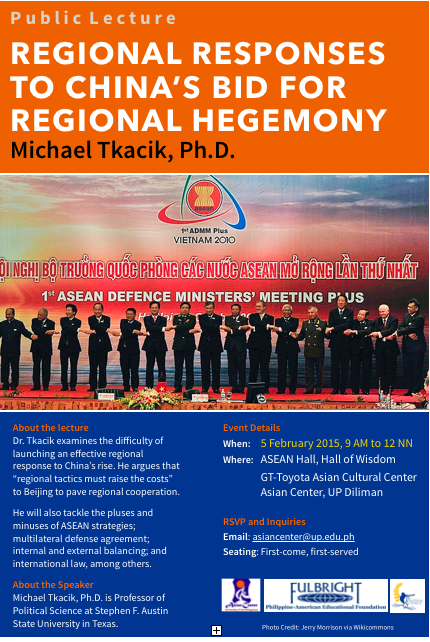 The Asian Center, in cooperation with the UP Department of Political Science and the Philippine-American Educational Foundation, will be hosting a public lecture, “Regional Responses to China’s Bid for Regional Hegemony” by Dr. Michael Tkacik on Thursday, 5 February 2015, 10 a.m. to 12 noon**** at the ASEAN Hall, Hall of Wisdom, GT-Toyota Asian Cultural Center, Asian Center, University of the Philippines Diliman.
The Asian Center, in cooperation with the UP Department of Political Science and the Philippine-American Educational Foundation, will be hosting a public lecture, “Regional Responses to China’s Bid for Regional Hegemony” by Dr. Michael Tkacik on Thursday, 5 February 2015, 10 a.m. to 12 noon**** at the ASEAN Hall, Hall of Wisdom, GT-Toyota Asian Cultural Center, Asian Center, University of the Philippines Diliman.
Dr. Michael Tkacik explains why “the most difficult level on which to respond to China’s challenge is regional” and argues that “regional tactics must raise the costs” for Beijing; although these costs will not be “prohibitive” to China, they can expose its intentions and facilitate “future cooperation among local states and any external balancer.” Dr. Tkacik will also cover the relevance of ASEAN; multilateral institutions, norms and expectations since World War II; and international law, including UN Charter Principles, Law of the Sea Treaty, and the Mekong River Commission.
Photo: Poster for lecture (click to view)
Furthermore, he inquires into the "pluses" and "minuses" of ASEAN responses; the possibility of a multilateral defense agreement; internal and external balancing; the nature of bilateral action; accommodation versus deterrence; and China’s “Long Game.” He then offers ways to “raise incentives of integrative behavior” among regional actors and to increase the “costs of disruptive behavior” on the part of Beijing.
Michael Tkacik, Ph.D. is Professor of Political Science and Director of School of Honors at Stephen F. Austin State University in Texas. He obtained his Ph.D. in Political Science, majoring in international relations, at the University of Maryland, College Park. The author of Nuclear Strategy in the 21st Century: Balancing Safety and Deterrence in an Anarchic World (2003), Professor Tkacik has written several refereed articles and book chapters spanning Pakistan’s nuclear weapons program; democratic controls on the Kyrgyz armed forces; U.S. policy and regional nuclear powers; autonomy agreements and conflict resolution; Islam and democracy; and dispute settlements of the World Trade Organization, among others.
Please confirm your attendance via This email address is being protected from spambots. You need JavaScript enabled to view it. and kindly note that seats are available on a first-come, first-served basis.
**** The lecture was originally scheduled for 9 a.m.
The Asian Center offers MA degrees in Asian and in Philippine Studies. The Asian Studies program offers specializations in Northeast Asian Studies, Southeast Asian Studies, South Asian Studies, or West Asian Studies. The Center also has an M.A. program in Philippine Studies that allow students to specialize on Philippine society and culture, Philippine foreign relations, or Philippine development studies. The Center also offers a Ph.D. program in Philippine Studies in conjunction with the College of Arts and Letters and the College of Social Sciences and Philosophy. Like the Asian Center on Facebook and follow us on Twitter @upasiancenter.

